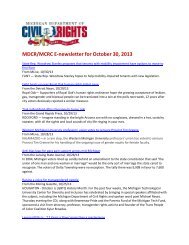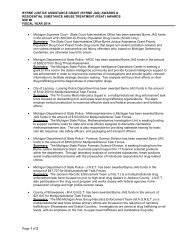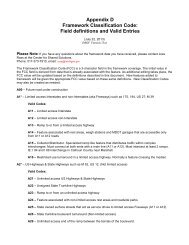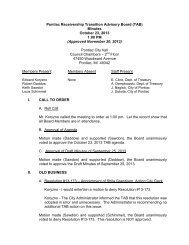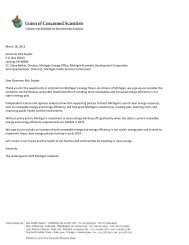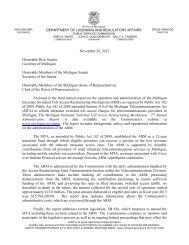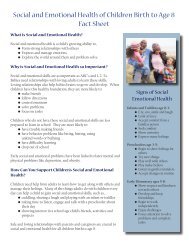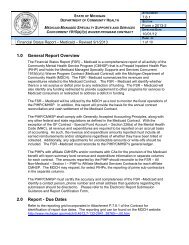michigan hypertension core curriculum - State of Michigan
michigan hypertension core curriculum - State of Michigan
michigan hypertension core curriculum - State of Michigan
You also want an ePaper? Increase the reach of your titles
YUMPU automatically turns print PDFs into web optimized ePapers that Google loves.
Policy Development: Public health pr<strong>of</strong>essionals contribute to policy development by supporting<br />
legislation, or working with organizations to change their internal policies. One well-known public<br />
health effort is smoke-free initiatives. Increasing <strong>of</strong> taxes, supporting local regulations, encouraging<br />
smoke-free worksite policies, encouraging coverage <strong>of</strong> smoking cessation treatment, and smoke-free<br />
legislation for public places are a few <strong>of</strong> the examples. Similar initiatives either are being done or could<br />
be done in <strong>hypertension</strong>. Some examples are as follows:<br />
1) Supporting improvements in coverage <strong>of</strong> prescriptions for <strong>hypertension</strong> control.<br />
Working with employer groups and insurers to recognize the importance <strong>of</strong> eliminating<br />
barriers, both cost and convenience to enhance adherence to antihypertensive treatment.<br />
2) Policies encouraging adequate physical activity in the schools, encouraging healthy<br />
choices in school lunch programs, and supporting community design that encourages<br />
physical activity, all are important strategies to prevent obesity and therefore reduce<br />
future <strong>hypertension</strong>.<br />
3) Policies that encourage restaurants and food manufacturers to label healthy food choices,<br />
the ingredients on products provide information to consumers so they can make healthy food<br />
decisions.<br />
4) Working with food producers to limit added salt in food products.<br />
5) Encouraging farm markets and increasing fresh foods at locations such as convenience<br />
stores where there are limited choices in many poorer communities.<br />
Assurance: Public health initiatives have been implemented to increase the utilization <strong>of</strong> evidencebased<br />
clinical guidelines for <strong>hypertension</strong>.<br />
Examples include the following:<br />
1) Working with the <strong>Michigan</strong> Quality Improvement Consortium (MQIC), MDCH<br />
representatives and staff have provided input to MQIC to support the assurance that<br />
physicians will follow the latest <strong>hypertension</strong> guidelines. The MQIC guidelines are<br />
disseminated statewide and are used by health organizations in pay for<br />
performance and other practice performance evaluations.<br />
2) Another role includes disseminating training material, supporting educational resources,<br />
screening forms and other material to provide guidance for appropriate community<br />
<strong>hypertension</strong> services.<br />
3) Public health supports services for high-risk, underserved populations. Free or low-cost<br />
clinics provide the screening and treatment needed for these populations.<br />
4) Public health programs focus on media and public education campaigns to<br />
inform the population about the importance <strong>of</strong> periodic screening, high BP<br />
control, appropriate treatment goals and treatment modalities. Providing<br />
services to the medically underserved is a critical component <strong>of</strong> public health.<br />
Collaboration with partners like the National High Blood Pressure<br />
Education Program and/or the American Heart Association,<br />
public health staff annually plan a range <strong>of</strong> educational or media<br />
events during National High Blood Pressure Month.<br />
5) Special MDCH projects have been funded: grants to health plans to enhance the<br />
tracking and process improvement activities for members diagnosed with high<br />
BP to increase control rates, a self-instructional BP measurement quality<br />
improvement program has been developed and disseminated to health<br />
pr<strong>of</strong>essionals statewide, projects in worksites have focused on<br />
increasing access to <strong>hypertension</strong> services.<br />
MDCH projects have incorporated and trained public health staff in the latest clinical<br />
guidelines such as the Maternal and Child Infant Program’s nursing interventions for<br />
146 Hypertension Core Curriculum




